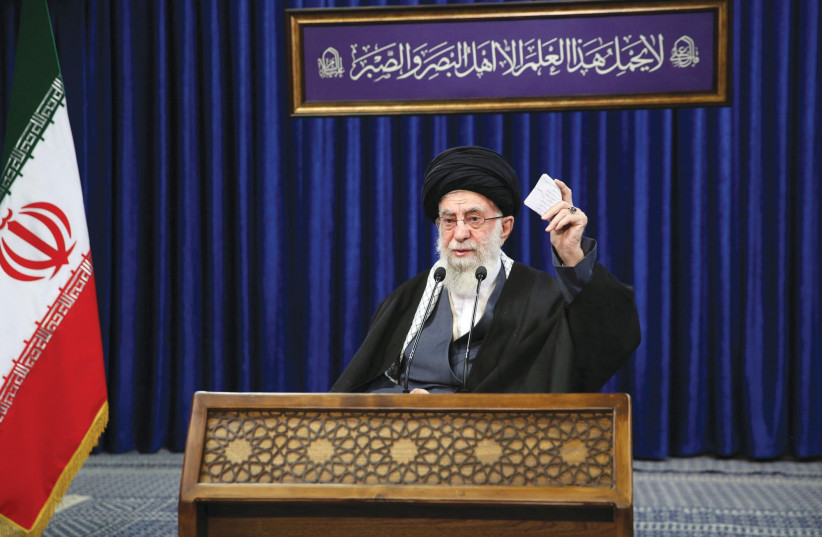Over the past few weeks, there has been a steely determination expressed by Israeli officials – political, diplomatic and security – toward Iran and its nuclear program.
For those of us who strongly believe in the Zionist ethos of placing the safety and security of the Jewish people firmly in our own hands and not relying on others, this is a welcome development.
While there is certainly a discussion about what the ayatollahs would do should Iran succeed in gaining nuclear weapons capability, what is not in doubt is that it would change the rules of the region. Having a nuclear weapons umbrella would certainly embolden Tehran’s proxies in the region, including Hezbollah in Lebanon and Hamas in Gaza.
It could also lead to a nuclear arms race in a region not known for stability and rational military doctrine.
This means that beyond the potential threat of some finger hovering over a button in Tehran at the behest of a regime that has shown a high level of capacity to sacrifice its own people, the State of Israel is right to be extremely worried about the Islamic Republic’s race toward a nuclear weapons capability.

Our leaders are right to oppose the talks in Vienna, and to say those talks will not bind Israel’s operational capacity. They are right to have strategic military operational plans ready for any and every occasion, should they believe Iran is close to the point of no return. They are right to follow the Begin Doctrine, which posits that no country or entity that threatens Israel’s existence should have the capacity to do so.
However, all of this stands in stark contrast to our behavior toward other threats. Take Hamas for example.
Our now seemingly regular wars with the Gaza-based terrorist entity are punctuated with a great concern about the reaction of the international community. Our operational clocks are guided by those reactions to the point where it is clear who controls the stop and start. Our leaders far too frequently run with indecent haste to Cairo after the first rocket to try and receive favorable terms for a ceasefire, before we have seriously hurt the enemy’s capacity to continually threaten our population centers.
We take maximum care to clarify and explain, even awkwardly, and justify every shot and operation undertaken in the aim of targeting a terrorist and openly genocidal organization.
We should instead be using the Iran playbook toward all of our enemies, big and small.
Israel is at war and targeted for annihilation by many entities on almost every border. Many of them are interconnected, whether it is the military hardware or the cooperation among the Jewish State’s enemies. Our war, whether shadow or not, against Iran is part of the same war against Hamas and other Palestinian terrorist organizations.
Our enemies learn from each other, and weakness on one front emboldens our enemies on another. Israel’s retreat from Lebanon in 2000 led to the Second Intifada. The disengagement from Gaza in 2005 led to the Second Lebanon War.
According to The Jerusalem Post’s Herb Keinon, there was a direct line between the original Lebanon withdrawal and the Second Intifada. In an article written last year, Keinon quotes several people, including US diplomat and negotiator Dennis Ross, Hezbollah chief Hassan Nasrallah, and Mohammed Dahlan, who said that the retreat in 2000 led to the bloody Second Intifada. Former Palestinian security chief Dahlan said “the minute the Palestinians saw Israeli soldiers running away and allowing the Lebanese to liberate themselves, they ask, ‘Why don’t we do it their way?’”
The disengagement from Gaza in 2005 had a direct negative impact on Israel’s deterrence, and was picked up by the Jewish state’s enemies. Following the disengagement, Hezbollah leader Nasrallah told the Palestinians, “Don’t forget that this is only the beginning. I want to remind you that when the Zionist army left Lebanon, it was the first victory in a chain of victories.”
Each one of our enemy’s victories emboldens the next. Iran, at least in part, increases belligerent behavior toward Israel because it perceives it as weak. The State of Israel must in turn perceive every enemy as one unit, and operate against it using the same principles.
Victory must be sought in every conflict, battle or war.
We must not completely disregard the international community, but we should be delivering a simple message: that Israel will operate forcefully against all of its enemies until they give up their war aims. Losing, retreating or being forced into a ceasefire in any theater of war emboldens and increases the attacks in another.
Israel’s senior officials are taking the correct action against Iran, even while taking the opposite approach against other threats. It is time to consider a holistic approach, because we should no longer separate our strategies.
As Nasrallah makes clear, one victory for Israel’s enemies will lead to another until they have achieved their aim of the destruction of the Jewish state. We should act accordingly and start defeating our enemies wherever and whenever they raise their hand against us.
This return to a victory approach will lead in turn to greater deterrence, sending a clear message to the international community, which will make it far easier to act against our greatest threat: an Iranian nuclear weapons capability.
The writer is a retired IDF commander and CEO of Mivtachi Israel, an organization of former senior IDF Officers.
